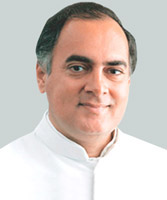 Rajiv Ratna Gandhi was born on August 20, 1944 and died on May 21, 1991, the eldest son of Indira and Feroze Gandhi, was the 9th Prime Minister of India from his mother`s death on 31 October 1984 until his resignation on December 2, 1989 following a general election defeat. Becoming the Prime Minister of India at the age of 40, he is the youngest person to hold that office. Rajiv Gandhi worked as a professional pilot for Indian Airlines before coming into politics.
Rajiv Ratna Gandhi was born on August 20, 1944 and died on May 21, 1991, the eldest son of Indira and Feroze Gandhi, was the 9th Prime Minister of India from his mother`s death on 31 October 1984 until his resignation on December 2, 1989 following a general election defeat. Becoming the Prime Minister of India at the age of 40, he is the youngest person to hold that office. Rajiv Gandhi worked as a professional pilot for Indian Airlines before coming into politics.
Early Life of Rajiv Gandhi
Rajiv Gandhi was born in India`s most famous political family. His grandfather was the Indian independence leader Jawaharlal Nehru, who would become India`s first Prime Minister after independence. He was born to Feroze and Indira Gandhi. Rajiv and his younger brother Sanjay Gandhi were brought up in Allahabad and Delhi. Rajiv suffered a great deal from the separation of his mother, who lived with Nehru to care for him. Even as his parents were united in 1958, Feroze died from a heart attack in 1959.
Rajiv was educated at two highly exclusive private boarding schools for boys at the Welham Boys` School and The Doon School, and he later attended university in the United Kingdom, at Imperial College London, and at the University of Cambridge, but he did not receive a degree. Rajiv Gandhi began to work for Indian Airlines as a professional pilot even as his mother became Prime Minister in 1966. He showed no interest in politics and did not live regularly with his mother in Delhi at the Prime Minister`s residence.
At Cambridge, he met and fell in love with an Italian student Sonia Maino. Maino`s family opposed the match, but Maino came to India with Rajiv and they married in 1969.
Achievements of Rajiv Gandhi
He began to put an end to the License Raj, government quotas, tariffs and permit regulations on economic activity, modernized the telecommunications industry, the education system, expanded science and technology initiatives and improved relations with the United States. He also was responsible for sending Indian troops for peace efforts in Sri Lanka, which soon ended in open conflict with the LTTE. He was awarded the Bharat Ratna posthumously in 1991. Rajiv Gandhi remained the Congressional leader till the elections in 1991.
Political Achievements of Rajiv Gandhi
It was following his younger brother`s death in 1980 that Rajiv was pressured by Congress politicians and his mother to enter politics. Rajiv and his wife were both opposed to the idea, and Rajiv even publicly criticized the idea. He did not contest for his brother`s seat, but he finally accepted as his mother announced his candidacy for Parliament. His entry was criticized by many in the press, public and opposition political parties, who saw the role of Nehru`s dynasty intensifying in Indian politics.
Rajiv became an important political advisor to his mother and in February 1981, was elected for Sanjay`s Lok Sabha constituency of Amethi in Uttar Pradesh state. Rajiv soon became the president of the Youth Congress. Rajiv was in West Bengal when Indira Gandhi was assassinated on October 31, 1984. Top Congress leaders, as well as President Zail Singh pressed Rajiv to become India`s Prime Minister. Owing largely to the feelings of sympathy in wake of Indira`s murder, the Congress party won a landslide victory. The margin of majority in Parliament was the largest in Indian history, giving Rajiv absolute control of government.
Prime Minister Rajiv Gandhi began leading in a direction significantly different from Indira Gandhi`s socialism. He improved bilateral relations with the United States which was long affected by Indira`s socialism and close friendship with the USSR and expanded economic and scientific cooperation. He increased government support for science and technology and associated industries, and reduced import quotas, taxes and tariffs on technology-based industries, especially computers, airlines, defense and telecommunications. He introduced measures allowing businesses and individuals to purchase capital, consumer goods and import without red-tape and bureaucratic restrictions. In 1986, Rajiv announced a national education policy to modernize and expand higher education programs across India. In the year 1986 Rajiv Gandhi founded the Jawahar Navodaya Vidyalaya System.
Rajiv authorized an extensive police and Army campaign to contain terrorism in Punjab. The Indo-Sri Lanka Peace treaty was signed by Rajiv Gandhi and the Sri Lankan President J.R.Jayewardene, in Colombo on July 29, 1987. Rajiv Gandhi was assassinated while campaigning, by a female LTTE suicide bomber Thenmuli Rajaratnam. His Italian-born widow Sonia Gandhi became the leader of the Congress party in 1998, and led the party to victory in the 2004 elections. His son Rahul Gandhi is a Member of Parliament.






